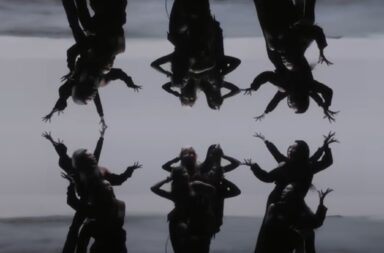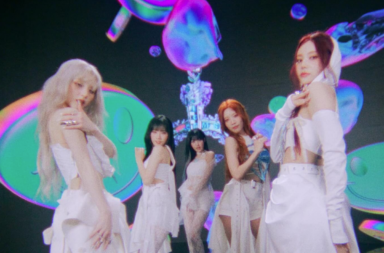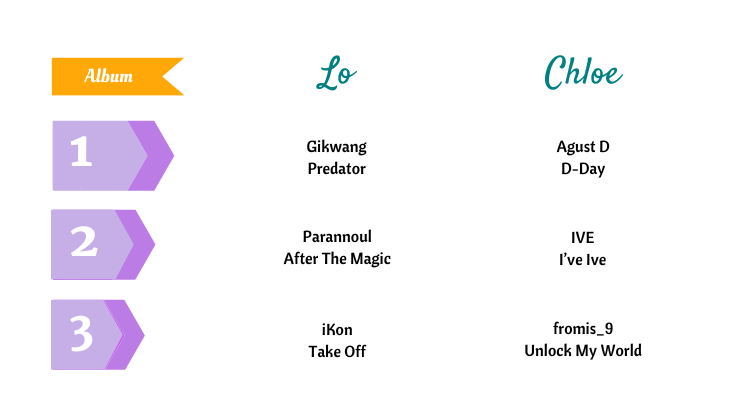
Now, for the full-length albums. A notoriously dwindling category in K-pop, this was a tough category for me to choose from, mainly because there seem to be fewer and fewer albums with more than five or six songs as the years (and months) go by. This year has already been a quiet one for full-length albums, but based on our lists, has still been a fairly solid one thus far.
Lo: I definitely hear you on the short list of albums, though there is a silver lining– I always have at least one pick from an artist I’d never have imagined. This year, that’s all three. Honestly, the least surprising for me is Parannoul’s After the Magic, which I knew was making the podium from note one.
After The Magic is what nostalgia sounds like. I don’t mean that it’s another album embracing that the 90s are back– though it is. And unlike most others, it’s not pulling from the pop charts. Instead, After The Magic is a glorious revisitation of the 90s college rock sound, the sort of thing that was the ubiquitous movie soundtrack even if it didn’t crack the top 10. It’s very raw and earnest, with a homemade edge that feels like Parannoul put this together in his bedroom a la Daft Punk’s Homework. Bright and glitzy, but with a warped edge and discordant beats to bely the reality underneath the flawless artifice.

No, the real nostalgia comes from the tone and lyrics. Parannoul isn’t a modern artist taking retro sounds for a spin. Instead, he himself is looking back and reminiscing. The good times were had, but now that they’ve ended, Parannoul cannot help but think them over. That backwards gaze adds a level of depth, the knowledge of the ending undeniably altering the memories. Some still shine bright, but other times the knowledge of how things end cannot help but taint things. I mentioned that After the Magic sounds like a movie soundtrack, and that’s how it feels– watching an old, familiar movie that still brings comfort even if some parts falter a bit once reality sets in.
Looking at your list, I’m not surprised to see Agust D or IVE make the list, but fromis_9 does. They’ve always had good hidden gems, but I’ve always felt that they struggle on releases as a whole.
Chloe: I definitely hear you on the strength of fromis_9’s releases, although in my view both Pledis and Hybe (since their acquisition of Pledis Entertainment and thus the group) haven’t given the group much of a chance to truly show all that they’re capable of, practically since their inception in 2017. It’s unfortunate that Unlock My World is only their first full-length album after all these years, but I was incredibly impressed by how much they solidified their breezy, retro sound on just their first official go.
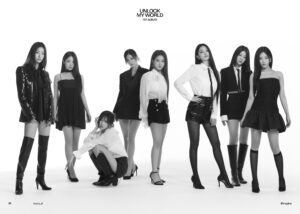
Taken altogether, Unlock My World is a taste of what fromis_9 have previously made a name for themselves for, like glimmering, catchy dance-pop tracks (“#menow,” “Attitude,” “Prom Night”) and more mellow, R&B-meets-city pop tracks (“Wishlist,” “My Night Routine”). But it’s also clearly the start of a new chapter for the now-eight-piece group, whose future was previously in limbo following member Jang Gyu-ri’s departure last year. Much of the album’s lyrics focus on self-love, reassuring listeners that the group’s story is still only just beginning — or rather, entering a new stage — even all these years later. All in all, the album is strikingly cohesive, both in sound and in narrative. It truly feels like we’re “unlocking [their] world,” as the album title proclaims.
Like fromis_9, I feel like iKon has had an interesting, sometimes tricky road to navigate as well. What put their latest on your list?
Lo: Remember how I said sometimes the best are solid, cohesive wholes, and sometimes they’re places where moments of greatness are able to compensate for weakness? Yeah, this is the latter, which isn’t much of a surprise given that being wildly uneven is fairly on-brand for iKon.
I will fully acknowledge the faults in Take Off. The production is sloppy, and in some cases, literally headache-inducing. There’s a notable number of tracks that fail to make any kind of impact. And there is no rhyme or reason to the genres, lyrics, or even track listing across the album. But when iKon gets it right, they knock it out of the park, and Take Off is no exception.
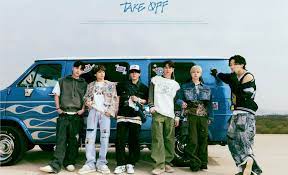
“U”, “Kiss Me”, and especially “Driving Slowly” are such high points that they are able to cover a multitude of sins. iKon thrives when they’re allowed to be charming, bringing a heartfelt earnestness that conveys the genuineness of their feelings. Tracks like “Want You Back” and “Like A Movie” are solid; softer tracks of regret laced with self-awareness and acceptance of their own failings. “U” and “Kiss Me” are playful exuberances from a frat house and a dark seduction respectively, but they sell the sincerity so well you can’t help but believe it wholeheartedly. And then “Driving Slowly”, which is a masterpiece, and honestly one of the best tracks of the year. It perfectly transports the listener, capturing the vibe of being young and in love, savvy enough to know that this relationship probably isn’t going to last, and smart enough to thus enjoy things while they do. Honestly, without “Driving Slowly”, Take Off wouldn’t be on my list. But with it, it presents such a peak for K-pop in 2023 that it felt inaccurate to leave it off in favor of something more cohesive but less spectacular.
IVE is one of those albums who are definitely more solid, but I’ve never been able to connect with them fully. What won you over?
Chloe: I won’t lie, this release definitely snuck up on me after a few listens. IVE is still fairly new to the scene, so I was also initially slow to connect with the group especially given their affinity for dropping pop hit after pop hit in singular, separate instances. However, I’ve IVE does a fascinating and mostly spectacular job at filling those gaps between the group’s single releases and connecting them together on one largely cohesive studio album.
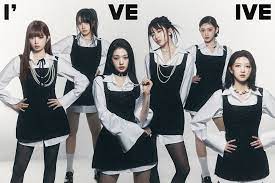
Like Take Off, I’ve IVE definitely has its shortcomings too — some production choices come off as off-kilter amidst the poppy and self-assured feel the album means to give off. However, the production excels in its uniqueness exactly where it needs to, like with the balance between marching drums, hypnotizing orchestral instrumentals, and a powerful chorus in standout opener “Blue Blood.” The group continues to strike this necessary harmony throughout the album too, from b-side “Hypnosis”’s glitchy synths paired with soft vocals to title track “I AM”’s robust tempo and beat and smooth, airy melodies. There are also several notable downtempo b-sides that hold listeners’ attention, as with most tracks on the album, with the gentle, earwormy power of the members’ vocals (“Lips,” “Heroine”), which show clear improvement (and are also just nice to hear in a different light) from the group’s past releases. Overall, I’ve IVE presents a lot of opportunities for directions the group can take next, and had me especially excited and confident in what’s to come from them.
Moving onto our remaining picks, I have to acknowledge that we’ve both chosen now-soloists from well-known, somewhat older boy groups (Highlight, BTS) who have both released their first official full-length albums this year. What put Gikwang’s Predator at number one on your list?
Lo: I think that’s something that speaks to the old adage that age begets wisdom, especially in an industry that worships youth. New ideas are the lifeblood of any art, but there’s a lot to be said for the school of experience, and I think both of our picks showcase that.
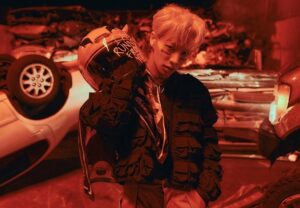
Musically, Predator immediately popped out at me, hitting quite a few of my sweet spots. Predator has everything. Dark new wave? Warped synthpop? Absolute despair? Warm, gooey guitar lines? 70s funk? Blasphemy as an act of love? All of the above undercut with a sense of foreboding? It’s all there! Gikwang has been writing and composing for over a decade, and it really shows. Everything is tight; no extraneous flourishes to clutter the tracks. The mixing is slick and clean, keeping the emphasis on Gikwang’s emotive vocals yet ensuring that the atmosphere set by the instrumentals doesn’t fade into the background. The whole album just sounds crisp and clear.
But what really cinched it was the lyrics. Have you ever wondered what goes on in the minds of toxic, codependent people? If yes, Predator has the answer. It’s a fascinatingly warped perspective on relationships through the lens of someone who thinks obsession is the same as love. We see him meet a woman and immediately try to monopolize her time and attention, lashing out when he can’t and eventually getting dumped (and taking it very badly). Yet that isn’t the end of the album, but the midpoint. Gikwang immediately repeats the same behaviors, but this time the red flags aren’t noted. The second half is a series of escalating acts of devotion, becoming more unhinged as he ties his entire sense of self into a relationship, making himself entirely dependent on this woman whose perspective is never shown. He only thinks about himself and the woman he uses for his needs, making it clear that despite labeling himself as prey, Gikwang is the real predator.
While Gikwang won me over with a captivating character study, Agust D went for a far more personal perspective. Is that what clinched it for you?

Chloe: That was exactly it for me! There’s always been something so inherently personal about Agust D’s music, between his early mixtapes to this release, D-Day. Although “Agust D” in a way is an alter ego of Min Yoongi as “Suga” of BTS, his portrayal of this persona across his discography really takes us as listeners as close to his inner thoughts and feelings as possible, and D-Day is no different. As a whole, the album is rich, heart-wrenching, and thought-provoking, yet also distances itself from the rage that epitomizes many of his previous releases, like his last album, D-2. If anything, D-Day is all about Agust D freeing himself of those past feelings of anger, which he relays through a myriad of diverse sounds, including a range of features (The Rose’s Woosung, the late Ryuichi Sakamoto, and even BTS’s own J-hope), traditional and modern instruments, and cool and fiery rap flows.
But what truly sets D-Day apart from any other contenders for best album of the year, as you mentioned with Predator, is also its lyrics. The album begins with a convincing proclamation that “Future’s gonna be OK” in “D-Day,” soon evolving into a biting, evocative critique on modern society’s fixations on both the unnecessary and the negative in the age of the Internet (“Haegeum,” “HUH?”). D-Day is at its most gut-wrenching and honest, however, on “Amygdala,” where Agust D revisits some of his own most personal and painful moments from his life, calling to his amygdala to save him from his trauma (“My amygdala/Please rescue me, please rescue me”). The second half encourages us, as listeners, that our traumas don’t have to consume or define us, however — there is much more to Agust D, to us, and to the world than the negatives and falsities that often seem to do so. D-Day is a rich text, and one that listeners will surely be returning to for years to come.
Well, that’s 2023 to the halfway point! There’s been plenty of good so far, and surely more to come for the remaining half of the year.
(Images via Longinus Recordings, Pledis, Hybe, YG Entertainment, Around Us Entertainment, Big Hit Music)

